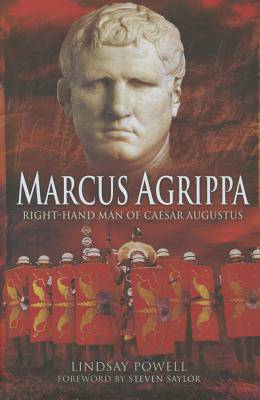
- Retrait gratuit dans votre magasin Club
- 7.000.000 titres dans notre catalogue
- Payer en toute sécurité
- Toujours un magasin près de chez vous
- Retrait gratuit dans votre magasin Club
- 7.000.0000 titres dans notre catalogue
- Payer en toute sécurité
- Toujours un magasin près de chez vous
34,95 €
+ 69 points
Format
Description
The first accessible, full-length study of this significant historical figure for over 75 years.
Marcus Agrippa personified the term 'right-hand man'. As Emperor Augustus' deputy, he waged wars, pacified provinces, beautified Rome, and played a crucial role in laying the foundations of the Pax Romana for the next two hundred years - but he served always in the knowledge he would never rule in his own name. Why he did so, and never grasped power exclusively for himself, has perplexed historians for centuries.
In his teens he formed a lifelong friendship with Julius Caesar's great nephew, Caius Octavius, which would change world history. Following Caesar's assassination on the Ides of March 44 BC, Agrippa was instrumental in asserting his friend's rights as the dictator's heir. He established a reputation as a bold admiral, defeating Sextus Pompeius at Mylae and Naulochus (36 BC), culminating in the epoch-making Battle of Actium (31 BC), which eliminated Marcus Antonius and Queen Cleopatra as rivals. He proved his genius for military command on land by ending bloody rebellions in the Cimmerian Bosporus, Gaul, Hispania and Illyricum.
In Gaul Agrippa established the vital road network that helped turn Julius Caesar's conquests into viable provinces. As a diplomat, he befriended Herod the Great of Judaea and stabilized the East. As minister of works he overhauled Rome's drains and aqueducts, transformed public bathing in the city, created public parks with great artworks and built the original Pantheon.
Agrippa became co-ruler of the Roman Empire with Augustus and married his daughter Julia. His three sons were adopted by his friend as potential heirs to the throne. Agrippa's unexpected death in 12 BC left Augustus bereft, but his bloodline lived on in the imperial family, through Agrippina the Elder to his grandson Caligula and great grandson Nero.
MARCUS AGRIPPA is lucidly written by the author of the acclaimed biographies Eager for Glory and Germanicus. Illustrated with color plates, figures and high quality maps, Lindsay Powell presents a penetrating new assessment of the life and achievements of the multifaceted man who put service to friend and country before himself.
Marcus Agrippa personified the term 'right-hand man'. As Emperor Augustus' deputy, he waged wars, pacified provinces, beautified Rome, and played a crucial role in laying the foundations of the Pax Romana for the next two hundred years - but he served always in the knowledge he would never rule in his own name. Why he did so, and never grasped power exclusively for himself, has perplexed historians for centuries.
In his teens he formed a lifelong friendship with Julius Caesar's great nephew, Caius Octavius, which would change world history. Following Caesar's assassination on the Ides of March 44 BC, Agrippa was instrumental in asserting his friend's rights as the dictator's heir. He established a reputation as a bold admiral, defeating Sextus Pompeius at Mylae and Naulochus (36 BC), culminating in the epoch-making Battle of Actium (31 BC), which eliminated Marcus Antonius and Queen Cleopatra as rivals. He proved his genius for military command on land by ending bloody rebellions in the Cimmerian Bosporus, Gaul, Hispania and Illyricum.
In Gaul Agrippa established the vital road network that helped turn Julius Caesar's conquests into viable provinces. As a diplomat, he befriended Herod the Great of Judaea and stabilized the East. As minister of works he overhauled Rome's drains and aqueducts, transformed public bathing in the city, created public parks with great artworks and built the original Pantheon.
Agrippa became co-ruler of the Roman Empire with Augustus and married his daughter Julia. His three sons were adopted by his friend as potential heirs to the throne. Agrippa's unexpected death in 12 BC left Augustus bereft, but his bloodline lived on in the imperial family, through Agrippina the Elder to his grandson Caligula and great grandson Nero.
MARCUS AGRIPPA is lucidly written by the author of the acclaimed biographies Eager for Glory and Germanicus. Illustrated with color plates, figures and high quality maps, Lindsay Powell presents a penetrating new assessment of the life and achievements of the multifaceted man who put service to friend and country before himself.
Spécifications
Parties prenantes
- Auteur(s) :
- Editeur:
Contenu
- Nombre de pages :
- 384
- Langue:
- Anglais
Caractéristiques
- EAN:
- 9781848846173
- Date de parution :
- 29-04-15
- Format:
- Livre relié
- Format numérique:
- Genaaid
- Dimensions :
- 150 mm x 236 mm
- Poids :
- 725 g

Les avis
Nous publions uniquement les avis qui respectent les conditions requises. Consultez nos conditions pour les avis.






